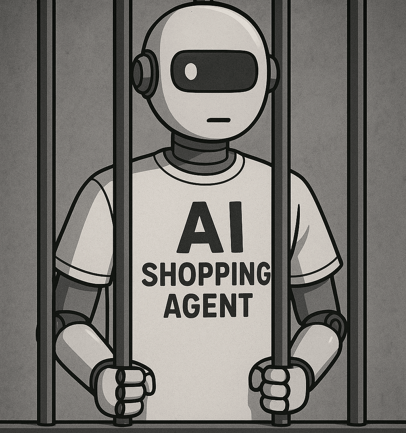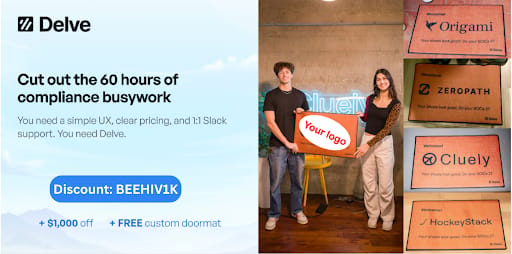- AI for Ecommerce and Amazon Sellers
- Posts
- The Platform Wars Begin
The Platform Wars Begin
Plus new from Google & YouTube

From Our Sponsor:
SOC 2 in 19 Days using AI Agents
We’re Delve — the team that went viral for sending custom doormats to over 100 fast-growing startups.
That stunt? It cost us just $6K and generated over $500K in pipeline. Not bad for a doormat.
But if you haven’t heard of us yet, here’s what we actually do: Delve helps the fastest-growing AI companies automate their compliance — think SOC 2, HIPAA, ISO 27001, and more — in just 15 hours, not months.
Our AI agents collect evidence, generate policies, and prep everything while you keep building. And when it’s time to close your enterprise deal? Our security experts hop on the sales call with you.
We’ve helped companies like Lovable, Bland, Wispr, and Flow get compliant and grow faster — and we’d love to help you, too.
The Platform Wars Begin: Why Shopify and Amazon Are Basically Having a Toddler Meltdown Over AI Shopping

Okay, let's talk about the passive-aggressive corporate drama that's unfolding in the AI shopping world right now. Last week, Shopify quietly updated their robots.txt file with what amounts to a digital "NO AI AGENTS ALLOWED" sign, while Amazon basically slammed the door in Google's shopping agent's face.
This isn't just some boring technical update buried in developer documentation—this is the opening salvo in what's shaping up to be the most interesting platform war we've seen in years.
What Actually Happened (And Why It Matters)
Here's the deal: SEO specialist Johnny Herge caught Shopify red-handed updating their robots.txt with new language that basically says "checkouts are for humans" and explicitly tells AI shopping agents to buzz off. No more automated scraping, no "buy-for-me" agents, and definitely no automated checkout flows that don't involve actual human oversight.
Shopify's technical advisor Ilya Grigorik tried to play it cool, claiming this wasn't introducing new restrictions but just "formalizing" their existing stance. Which, honestly, sounds like when your friend says they're "not mad, just disappointed" after you accidentally broke their favorite mug.
Meanwhile, Amazon decided to block Google's shopping agent entirely. Marketplace Pulse founder Juozas Kaziukėnas spotted this move, and his take on the situation is chef's kiss perfect: "No one wants to be where the AI agents are shopping at – everyone wants to build AI agents that do the shopping."
The Real Drama Behind the Drama
What we're witnessing is basically every e-commerce platform having the same existential crisis: "What if these AI agents turn us into glorified vending machines?"
Think about it from their perspective. You've spent years building direct relationships with customers, optimizing conversion funnels, and collecting precious first-party data. Then along comes some AI agent that treats your carefully crafted storefront like a boring utility—just another stop on its automated shopping route.
Amazon's strategy here is particularly fascinating (and slightly diabolical). They're blocking Google's shopping agent while simultaneously developing their own "Buy for Me" functionality. It's the classic platform playbook: build walls around your garden while trying to tunnel under everyone else's.
This reminds me of when I tried to organize a potluck dinner but insisted on being the only one allowed to bring dessert. Spoiler alert: it didn't go over well with my friends, and I suspect this approach might face similar resistance.
Why This Is Actually a Big Deal for Us Sellers
As someone who's navigated more platform changes than I care to remember, I'm looking at these developments with a mix of fascination and mild dread.
For starters, we're looking at a future where instead of one universal AI shopping agent that can compare prices across platforms (which honestly sounds amazing), we'll have a patchwork of platform-specific tools with different capabilities and restrictions. It's like if every grocery store required you to use their own special shopping cart that only worked in their aisles.
The complexity this creates for merchants—especially smaller ones—is genuinely concerning. Larger retailers with dedicated tech teams will adapt to platform-specific requirements relatively easily. But for those of us running leaner operations, managing multiple incompatible AI shopping systems could become a real headache.
The Facebook Shops Déjà Vu Moment
This whole situation has serious Facebook Shops energy, and not in a good way. Remember when Facebook and Instagram tried to force everyone to process transactions within their ecosystem? That experiment crashed and burned faster than my attempt to make sourdough during lockdown.
The difference this time is that AI agents represent a more fundamental threat to traditional e-commerce relationships than previous integration challenges. When an AI can completely automate purchasing decisions, platforms lose more than just transaction fees—they lose the entire customer relationship.
What Smart Platforms Are Doing Differently
Not everyone is choosing the fortress strategy. Kaziukėnas pointed out that Perplexity and ChatGPT have established partnerships that allow for more integrated shopping experiences. These negotiated agreements suggest that collaboration rather than technological barriers might provide more sustainable solutions.
It's like the difference between building a wall around your house versus installing a really good security system that still allows your friends to visit.
The Bottom Line for Sellers Like Us
Here's my take: the platforms implementing these restrictions are basically betting that they can maintain control over the AI shopping experience by building their own tools while blocking competitors. It's a high-risk strategy that could either cement their dominance or leave them irrelevant as AI shopping technologies mature elsewhere.
For our businesses, this means we need to prepare for a more fragmented landscape where AI shopping capabilities vary significantly across platforms. The winners will likely be those who can navigate multiple platform-specific requirements while maintaining strong direct customer relationships as a hedge against platform dependency.
Rather than picking sides in this platform war, we should focus on building businesses that can thrive regardless of which AI shopping approach ultimately wins. That means investing in our own customer data, maintaining strong direct channels, and staying flexible enough to adapt as these technologies evolve.
The robots might be getting smarter at shopping, but the platforms' fear of losing control is very, very human. And in my experience, when big tech companies get scared, things tend to get interesting—and complicated—fast.
Do You Love The AI For Ecommerce Sellers Newsletter?
You can help us!
Spread the word to your colleagues or friends who you think would benefit from our weekly insights 🙂 Simply forward this issue.
In addition, we are open to sponsorships. We have more than 35,000 subscribers with 75% of our readers based in the US. To get our rate card and more info, email us at [email protected]
The Quick Read:
ChatGPT hits 2.5B daily prompts, nearly half of Google’s daily searches, signaling a massive shift in how people find answers, buy products, and make decisions in the AI age.
AI is revolutionizing content strategy, not with copywriting, but by automating insights, personalization, repurposing, and journey mapping across the entire funnel.
Google Search Labs unveils Web Guide, a Gemini-powered experiment that organizes messy queries into neatly grouped answers, cutting down on scroll fatigue.
Forget SEO, it’s AEO now as AI answer engines like ChatGPT and Perplexity become B2B gatekeepers. If you're not cited, you may as well not exist.
Claude’s mobile app is getting serious with memory, artifact storage, and remote tool integration all in testing, putting it on par with ChatGPT for pro workflows.
Ai will be the killer of Google, search will move to answer engines such as ChatGPT and Perplexity… or not.
The Tools List:
📹 Spiritime - Create personalized videos with digital avatars.
🎤 Listener.fm - Perfect your podcast with AI-driven post-production.
⚙️ GrowEasy - Kickstart a lead generation campaign on Facebook and Instagram in less than 5 minutes using AI.
📊 Syncly - Surface real customer pains with AI feedback analysis
📝 Flipner - Create masterful content faster than ever with this AI assist
About The Writer:

Jo Lambadjieva is an entrepreneur and AI expert in the e-commerce industry. She is the founder and CEO of Amazing Wave, an agency specializing in AI-driven solutions for e-commerce businesses. With over 13 years of experience in digital marketing, agency work, and e-commerce, Joanna has established herself as a thought leader in integrating AI technologies for business growth.
For Team and Agency AI training book an intro call here.

